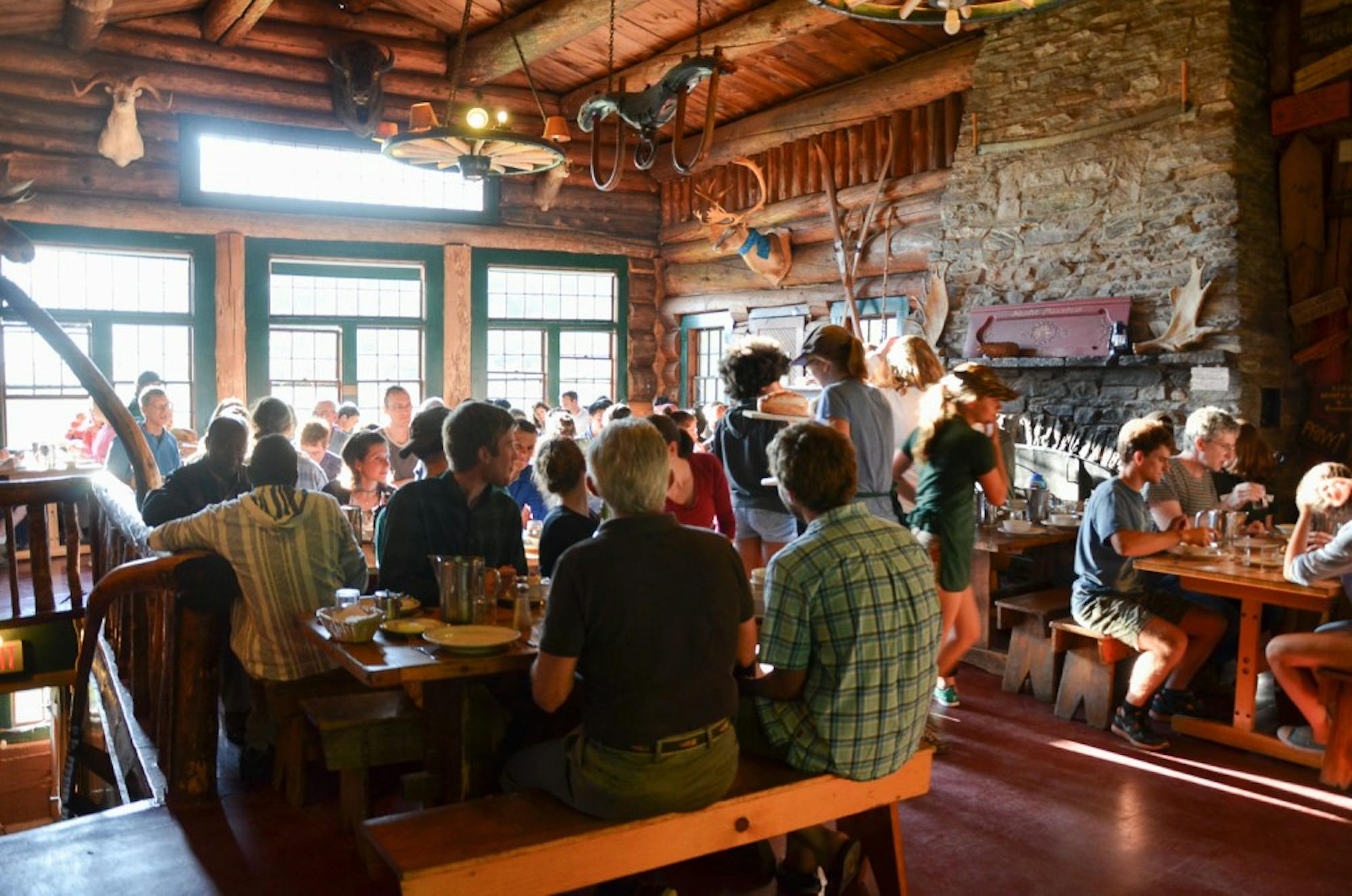George “Skip” Battle ’66 has pledged to contribute up to $5 million to the College for the construction of the new Moosilauke Ravine Lodge, the College announced on Friday. Battle, former Ask.com CEO and senior Aspen Group member, will match donations from any source up to $5 million, for a possible $10 million gift in total, more than half of the total projected cost of $17 million to rebuild the structure.
The plans for the new Lodge intend to preserve the atmosphere and log-cabin feel of the old building while offering improved functionality, such as a larger kitchen and dining space and increased energy efficiency.
The current Lodge, which was originally intended to last 40 to 45 years, is now more than 77 years old and suffers from structural issue such as rotten logs and insufficiently large interior spaces.
In addition, the new building is intended to be more functional year-round, whereas the winter months can present difficulties with the current Lodge at its location on Mount Moosilauke, which can experience significantly colder temperatures than Hanover. As part of increasing the Lodge’s year-round usability, Battle said that the new design includes classrooms or meeting rooms, which he suggested could be used for the College’s already significant research relating to the North Woods that span Canada and the northern United States.
Feyaad Allie ’16, who was a member of Lodj Croo this past summer as part of Dartmouth Outing Club’s First-Year Trips program, expressed support for a rebuild Lodge that would retain the look and character of the current one. Allie also mentioned significant problems with the current structure, and said that he believes that building is likely a fire hazard.
Allie also mentioned potential improvements such as upgrading the kitchens, in addition to building guest accommodations like the ones in the newer adjacent bunkhouses.
He noted, however, that some people were not in favor of rebuilding the Lodge because of the deep sense of tradition associated with the current building. Battle addressed these concerns, saying that the construction project is committed to maintaining the essence of the old Lodge.
“We’ll modernize the function and traditionalize the environment,” Battle said. “It’s not going to be exactly as Moosilauke was ,but it is going to retain the feel.”
To this end, the new Lodge will retain familiar aspects of the old one, such as the fireplace and general layout of the main dining room.
“We’re going to try to keep the lodge as evocative of the past as possible,” he said.
The design of the new Lodge has been finalized and construction is scheduled to begin in fall 2016 after Trips have concluded, director of outdoor programs Dan Nelson ’75 said. The Lodge is then scheduled to be complete in time for Trips in 2017. It will be unavailable during construction, meaning the project will have to be carefully coordinated with the Trips program. The time frame is dependent on the College being able to successfully raise the $17 million needed for the renovation and on the plan’s approval from senior administrators and Trustees.
Nonetheless, Battle’s “very generous gift gets us off to a great start,” Nelson said. In discussing the fundraising for the project, Nelson said that securing large sums of money is always challenging, but the Lodge project “resonates with so many alumni because so many of these alumni had a great first experience at Dartmouth at the Lodge, often through their First-Year Trips,” he said.
Even when he attended the Moosilauke Ravine Lodge’s 60th anniversary in 1998, Battle noticed that the condition of the Lodge was beginning to show visible signs of age and deterioration.
“It was getting to the point where keeping it up was more problematic year after year,” Battle said. “It was wearing out. It was wonderfully nostalgic, but it wasn’t wonderfully modern.”
As early as 2008, the Moosilauke Advisory Committee, which advises the Outdoor Programs Office now run by Nelson, recommended the replacement of the old Lodge.
Battle has donated to the College before, having previously supported the construction of a new rugby field and the creation of The Battle Family Fund for Ethics Across the Curriculum, in addition to general donations to the Dartmouth College Fund.
“Battle has been an extraordinarily generous supporters of things at Dartmouth, and we’re extraordinarily grateful,” Nelson said.
“The first decision [to donate] wasn’t about Moosilauke, it was about Dartmouth,” Battle said. “And I think Dartmouth was the reason for any of the success that I’ve had in life because of the academics and the friendships that I made. It starts out of a sense of gratitude for the College and then it moves onto Moosilauke.”
Battle fondly remembers his Trip, marked by nostalgic memories such as then-College President John Sloan Dickey ’29 speaking by the Lodge fireplace.
“I came from a very small community [in the village of Chepachet, Rhode Island,] so the notion of spending time in the woods as a way of getting used to college life was perfect to me,” he said.
Part of Battle’s intention in donating is to maintain this experience for future generations of freshmen, a notion which is “reassuring and heartwarming,” he said.
Battle also is connected to the College through two alumni children, Daniel Battle ’01 and Emily Battle ’05.
“Moosilauke stands at the center of the Dartmouth environment that’s away from the bustle of the city and where there is a sense of community,” he said. “An asset that’s not reproducible by any school that may compete with Dartmouth and it’s really inexpensive to maintain compared to other important parts of a university.”




